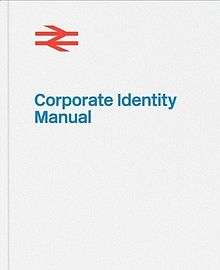British Rail Corporate Identity Manual

The British Rail Corporate Identity Manual is a corporate identity guide created in 1965 by British Rail. It was conceived in 1964, and finished in July 1965 by British Rail's Design Research Unit,[1] and introduced British Rail's enduring "double arrow" logo, created by Gerald Barney and still in use today as the logo for National Rail.[2] The manual spanned four volumes, and was created as part of a comprehensive redesign of British Rail following the Beeching Cuts as part of a plan to attract more passengers.[3] It is noted as a piece of British design history.
The first volume, published in July 1965, introduced Rail Blue, a standardised colour for use of rolling stock liveries and the total adoption of Rail Alphabet, a typeface designed by Jock Kinneir and Margaret Calvert, for use across the British Rail network.[4] It was exhibited at the Design Council, London in the same year. The second volume was published in November 1966, contained guidance on printed publicity such as posters and regional logos.[5] The third and fourth volumes, issued in 1970, focused on the non-rail sectors of British Rail, including architecture, and new branding for Sealink.[5][6]
In 2016, the manual raised £55,102 for a reprint, combining the four volumes into one book.[7][8][9]
References
- ↑ "The much-anticipated British Rail Corporate Identity Manual reproduction is here". It’s Nice That. 2016-11-15. Retrieved 2016-12-02.
- ↑ Jackson, Tanya (2013). "6: In Search of an Identity". British Railways: The Nation's Railway. Stroud: The History Press. ISBN 9780752497426. Retrieved 11 September 2015.
- ↑ "British Rail Reissues Its Iconic Midcentury Graphic Standards Manuals". Co.Design. 2015-12-04. Retrieved 2016-12-02.
In the 1950s, it gradually began losing money and traffic declined, so the leadership looked for ways to reverse the misfortune. They decided that a corporate identity could help unify the disjointed railway network and hired the Design Research Unit in 1964 to conceive of the concept, which was finalized in 1965.
- ↑ British Rail Corporate Identity. pp. Sheet 1/10.
- 1 2 "Design Research Studio's British Rail Corporate Identity Manuals to be published in entirety". It’s Nice That. 2015-11-23. Retrieved 2016-12-02.
- ↑ British Rail Corporate Identity Manual. pp. Sheet 7/01.
- ↑ "British Rail Corporate Identity Manual". Kickstarter. Retrieved 2016-12-02.
- ↑ "Manual labour - Creative Review". Creative Review. 2015-12-21. Retrieved 2016-12-02.
- ↑ Is the British Rail logo a design icon?, BBC News, 2015-12-20, retrieved 2016-12-02